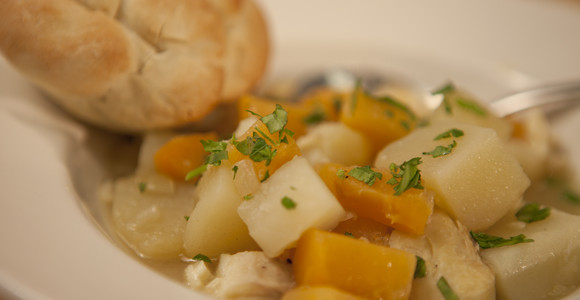Parks Canada Heritage Gourmet Recipes
Eel Stew
The eels of the Bras d’Or Lakes of Cape Breton have been a staple food for the local Mi’kmaq communities for centuries. This simple stew will bring the taste of the past to your table.

Origin: St. Peters Canal National Historic Site
Region: Atlantic (Nova Scotia)
Period: Traditional
Course: Main Course
 Eel
Eel© Parks Canada
The isthmus separating the Atlantic Ocean and the Bras d’Or Lakes in Cape Breton was used as a portage route by the Mi’kmaq for thousands of years before the first European settlers arrived in the area. The construction and use of increasingly larger vessels led to the commissioning of a study for a canal crossing, and in 1869 the canal became a reality. Today, all types of pleasure craft, local fishing craft and the occasional commercial vessel use the canal during the spring, summer and fall. It is believed that the eels of Bras d’Or Lakes also use the historic canal in their travels. The Mi’kmaq of nearby Chapel Island fish for these eels, continuing a tradition that is centuries old.
Eel Stew
Ingredients:
- 4½ lbs | 2 kg (2 eels) skinned or 3 ½ lbs | 1.5 kg halibut, cod or mackerel filet*
- 1 small turnip, sliced
- 1 onion, chopped
- 6 medium potatoes, quartered
- 2 cloves garlic
- 1 tsp | 5 ml salt
- ½ tsp | 2.5 ml pepper
- 6-8 cups | 1½-2 litres cold water
- 2 tbsp | 30 ml butter
Directions:
- Cut the fish into roughly 2-inch (5 cm) pieces. Place in a saucepan and cover with cold water. Bring to a boil and then reduce the heat, simmering for 30 minutes to tenderize. Drain.
- In a large saucepan place the turnip, onion, garlic, salt and pepper and cover with cold water. Bring to a boil and then reduce heat and simmer until the turnip is partially cooked. Add the potatoes, fish and butter. Continue cooking until vegetables are tender, adjusting the seasoning if necessary.
- *For this recipe, we used a firm fish (halibut) instead of the eel as we found eel hard to find and when we did find it, it was almost always precooked and smoked. Any fish that does not break down when cooked will work.
Credits:
Recipe tested by Chef Sean Edwards, Algonquin College School of Hospitality and Tourism
This recipe was adapted from the book Nancy’s Wedding Feast and Other Tasty Tales by James O. St. Clair and Yvonne C. LeVert, Illustrated by Peter Rankin, © Cape Breton University Press, 2007.
Related links
- Date modified :